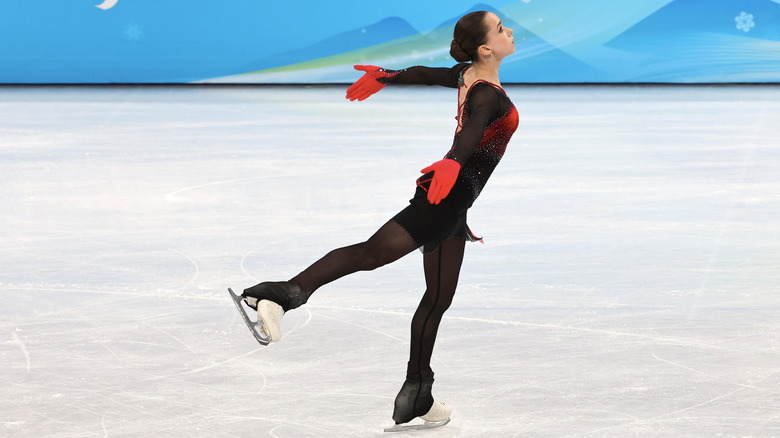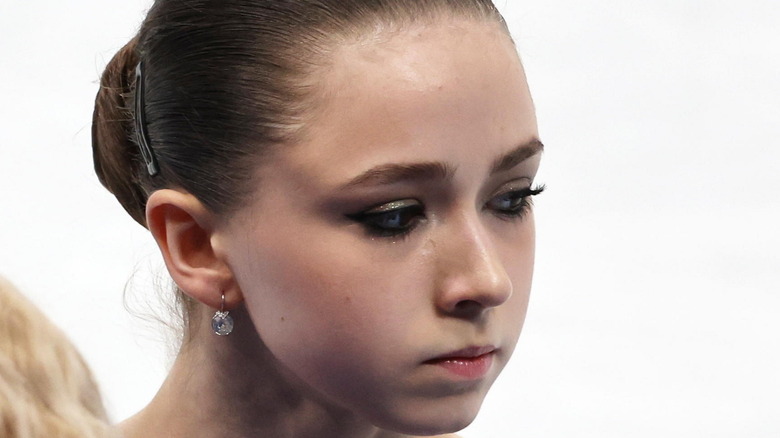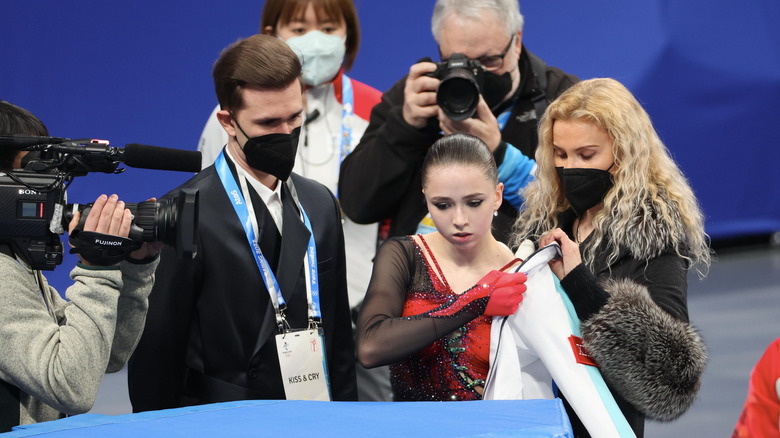The Figure Skater Kamila Valieva Controversy Fully Explained
Women's ice skating events at the 2022 Beijing Olympics have been tumultuous and a topic of extensive press coverage — all due to some drug-testing results and a controversial decision.
15-year-old Kamila Valieva competing for the Russian Olympic Committee (ROC) is the ice skater at the center of the storm at the 2022 Olympics. Like all Olympic skating competitors, Valieva took a urine test in December 2021 to test for performance-enhancing or illegal drugs. She tested positive for trimetazidine (TMZ) (via The New York Times). The problem was that her results didn't come back until 44 days after she took the test. By then, she and her teammates had already competed in Olympic events.
The World Anti-Doping Agency, the International Olympic Committee, and the International Skating Union reacted immediately. Russia has had numerous doping scandals in the past, and these three groups demand a drug-free and even playing field for all Olympic competitors. The Court of Arbitration for Sport opened an investigation to determine if Valieva would be allowed to keep competing, or if her career had come to an abrupt end.
According to The New York Times, there were three chemicals detected in Valieva's urine that could be linked to performance-enhancing drugs. But Valieva says that the drug-testing result was a mistake, and that she had not used any performance-enhancing drugs at all.
Confusion and delays
Valieva did say that her grandfather takes the medication TMZ, and that she could have accidentally consumed some of the medicine by sharing cups or plates with him. The drug is commonly used for heart issues like angina and can affect heart rate and blood pressure levels (per Science Direct). The Court of Arbitration for Sport said they had not been given proof that her grandfather took the medication.
An emergency panel convened to make a ruling, producing a 41-page report. They suggested that because Valieva is a minor, her sentencing should not result in suspension. And although Valieva's testing sample was late getting back from a Stockholm-based laboratory, the Court ruled that she should not be held accountable for the 44-day delay.
Their conclusion? "None of this is the fault of the athlete, and it has put her in a remarkably difficult position where she faces a lifetime of work being taken from her within days of the biggest event of her short career," stated the Court of Arbitration for Sport panel members (via The New York Times). The Court ruled that Valieva would be allowed to keep skating in the Beijing Olympics. Many skaters perform only through their teenage years or early twenties — so a ruling to suspend her from skating at Valieva's young age would be devastating.
A "failed system"
Valieva's case caused a flurry of confusion and last-minute changes. At first, it was ruled that if Valieva earned a medal, she would not be able to keep it. The International Olympic Committee told the women's skating teams that if Valieva placed in the top three, they would not hold an official medal ceremony, and no one involved would receive their medals, flowers, or be allowed to stand on the podium, either (via The New York Times). Instead, they said they would withhold awards until Valieva's case had been resolved.
The stress likely impacted Valieva's performance. During the women's free skate event on February 17, 2022, she made numerous mistakes and fell several times. After her performance, she began crying, and her coach criticized her for the missteps. She came in fourth place, according to AP News.
The Court of Arbitration said Valieva has since tested negative for the drug in both January and February. Per The New York Times, the Court stated that both Valieva and the other women competing had all been negatively impacted by the controversial case and a "failed system" of drug testing.


